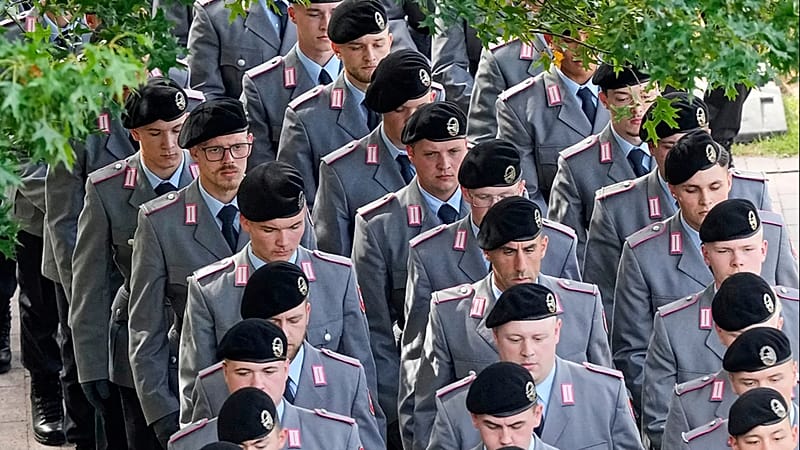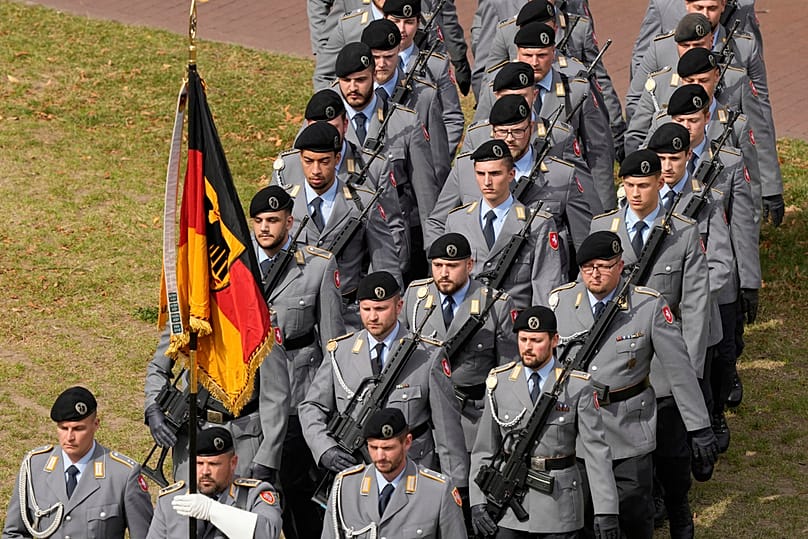Germany inches close to agreement on contentious military service but questions remain

The German government could present a solution to the military service model this week, Federal Defence Minister Boris Pistorius (SPD) announced during a visit to the troops in Münster on Monday.
"Sometimes it just takes a bit of time, and not everything that is presented as a huge dispute ends up being one," said the SPD politician.
Pistorius' announcement came months after the Bundestag passed a new law on military service aimed at bringing in tens of thousands of recruits every year.
But the draft bill, which initially foresees voluntary service, with disputed plans to include a mandatory element in the future if needed, has raised questions.
According to Thomas Röwekamp (CDU), Chairman of the Defence Committee, the only thing standing in the way of the final model is the details. He is also convinced that an agreement will be reached this week.
It is unclear whether military service will be announced on the 70th anniversary of the Bundeswehr on 12 November or before the coalition committee. According to Röwekamp, there are still some "unresolved issues".
Why is the military service bill controversial?
According to the draft law on the "New Military Service", the Ministry of Defence plans to increase the size of the defence force to around 460,000 soldiers, including the reserve, in the long term as part of national and alliance defence.
Of these, the proportion of active soldiers should be around 260,000. This target includes around 200,000 reservists and is based on the time horizon of 2035, according to the Ministry of Defence.
When it comes to military service, however, Pistorius repeatedly emphasises that the troops must be strengthened through voluntary service, because "that is the consensus in the coalition agreement between the CDU, CSU and SPD."
Despite the minister's clear statement, the planned military service reform is dividing the current coalition.
Pistorius is in favour of voluntary, attractive military service - based on the Swedish model - which will be supported by a nationwide draft of young men.
Compulsory conscription would only take place if voluntary service is not sufficient. In this context, the SPD wants to modernise the Bundeswehr with a "huge package to increase its attractiveness".
The CDU/CSU, on the other hand, favours a random selection process to cushion potential recruitment bottlenecks. Pistorius rejects this and favours selection based on physical aptitude and professional skills instead.
Opinions also differ when it comes to the increase in personnel: the CDU/CSU is calling for concrete targets for the increase in the number of troops in order to meet demand.
The SPD, on the other hand, wants to initially focus on voluntary service and increasing attractiveness and thus make the growth of the troops more flexible.
"Another document of hesitation"
Military historian Sönke Neitzel, who was invited as an expert witness, warned at the hearing of the Defence Committee on 10 November that the voluntary approach alone would hardly be enough to secure the desired number of Bundeswehr personnel.
According to Neitzel, the draft law is undoubtedly a "step in the right direction to make the Bundeswehr fit for war".
He is also in favour of the planned general conscription from summer 2027, but the draft law is also a "half-hearted demonstration of German security policy over the last three and a half years". "In my opinion, it is another document of hesitation and procrastination," explains the military historian.
"The introduction of compulsory conscription would be absolutely essential for a rapid increase in the number of personnel in the Bundeswehr," said Neitzel.
However, he conceded that this does not appear to be politically feasible at present, which is why the Ministry of Defence assumes that the increase in personnel can be achieved through voluntary service.
In his written statement, Neitzel also referred to the strategic threat: according to statements by the German government, Russia could attack NATO in a few years.
"The Ministry of Defence believes that an increase can be achieved on a voluntary basis by 2035. This means that an average increase of 8,000 troops per year has been set as a target".
He added: "If the Bundeswehr had grown at this rate when it was established during the Cold War, the build-up would have taken 60 years".
Pistorius assumes that between 60,000 and 100,000 additional soldiers are needed to fulfil NATO requirements and make the troops fit for war.
Although no solution has yet been found, the law is due to come into force on 1 January 2026. Compulsory conscription of all young men is to take place from July 2027 or 2028.


